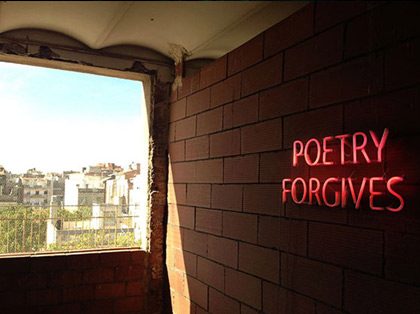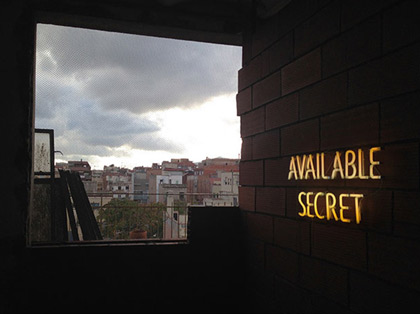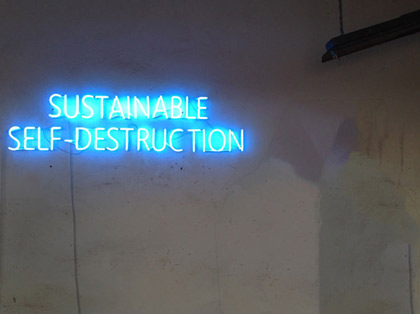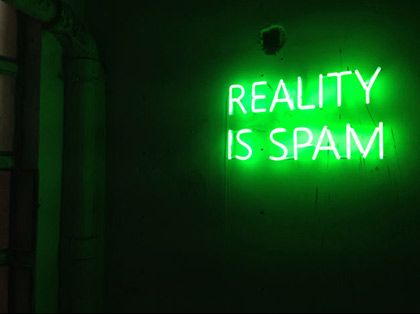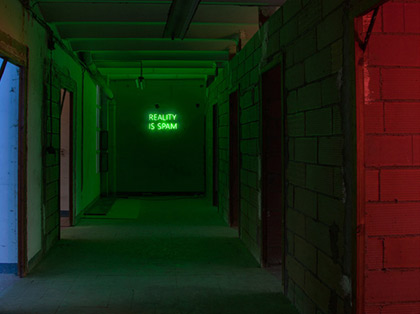Arte sociológico e interacción urbana
En una línea bien diferente del arte sociológico de Hervé Fisher y Fred Forest en París, las intervenciones insólitas de Enrique Baeza en la vía pública sorprenden a la sociedad neoyorquina. La aparición de palabras, frases, paradojas, analogías y contradicciones originales provocan la implicación activa del público Heredero de una tradición que incluye a Brossa, Holzer, Baldessari, Kosuth, Wiener o Ruscha, la propuesta de Enrique Baeza reivindica la comunicación interpersonal desde la íntima relación del individuo con el lenguaje, haciendo de las palabras el lugar de encuentro. Espacios de escisión. Fracturas en la dramaturgia del paisaje interior para activar la ecología psíquica y espiritual del cuerpo social al que pertenecemos; ese cuyo pensamiento, bien lo sabe Enrique Baeza, antes que dormido está hipnotizado. Âlex BrahimEnrique Baeza (Barcelona, 1972) experimenta con los límites de la comunicación personal y de masas.
Y lo hace en un contexto en el que el lenguaje, limitado en sí, se ha convertido en un instrumento poco útil. Utiliza recursos de la propaganda, de la poesía, del street art y de la televisión para ofrecer mensajes, tanto en el espacio público como en el privado, que esgrimen un desafío. Está interesado en reivindicar un nuevo tipo de lenguaje que sirva de alternativa a unos códigos de comunicación pobres, mutilados, dirigidos ideológicamente y obsoletos. Por eso, elabora eslóganes que juegan con la paradoja para desplegar su propio significado, mensajes que hacen alarde de su propia condición de objetos inacabados induciendo al receptor a tantear múltiples interpretaciones para construir sentidos desde diferentes categorías ontológicas, que abarcan desde lo más mundano hasta lo más abstracto
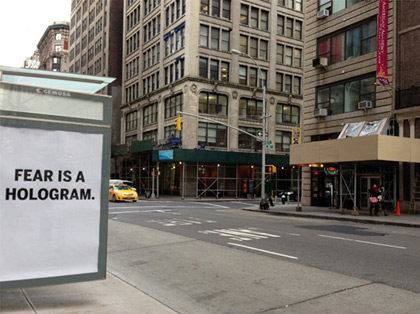
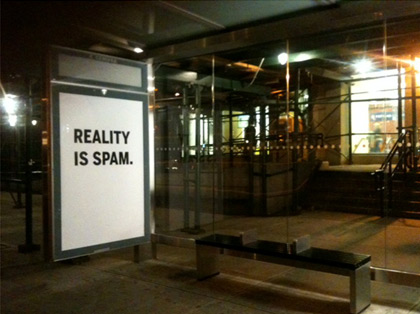
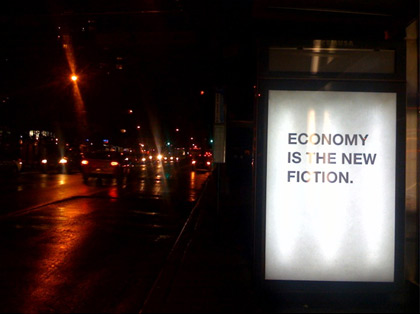

What caught my attention immediately after reading the first few sentences in Enrique Baeza’s new project is his ability to diversify the semantics of simple sentences along multiple dimensions, pertaining both to the public (read also social, political, economical, institutional) and the private (read also intimate, psychological) realms.
No single message is intended. There are as many as receivers. The receiver does the decoding. If Grice were right, there shouldn't be any communication, since he tells us (and most people believe) that communicative intention is reflexive; that what we intend to communicate requires our audience's recognition of that very intention. Yet, the theory wonderfully fails here. Or perhaps it only backfires by way of demanding us to ascribe a myriad of intentions to the author —for every single recipient, every single member of the audience, is an active decoder. This is clearly Enrique Baeza’s ultimate goal: to reclaim the magic of language, to encourage us to dive in the maze of semantic alleys to explore and discover language in a society where words come far too often in empty and repetitive prêt-à-porter packages. And through language, we reclaim humanity. Enrique Baeza’s words make the audience work. They wake us up.
I am sure this effect is achieved by all kinds of subtle semantic and shamanic moves, most of then unconscious and hence deeply revealing. I should not dare to comment on that, but one other thing strikes me as of the essence here. One may be inclined to talk about polysemy as part of the aesthetic and ideological moves going on in Enrique Baeza’s work (yes, there is ideology, and that’s part of the attraction too). But one should then be careful not to oversimplify things, because, unlike many polysemic terms, which happen to refer to objects and properties of the same type, the polysemy here cuts across different ontological categories: from the most mundane to the most abstract. Don’t mind the gap.
Josefa Toribio, filósofa




Una nueva forma de hacer retratos. Las palabras pueden mostrar la esencia del individuo de forma tan certera como una pintura o una fotografía, incluso más. Baeza cree en el poder de la palabra y en que cada persona posee una bella y delicada idea interior que puede emerger a través de las palabras. A través de un método de sesiones basado en la escucha activa, Baeza trabaja con la biografía del sujeto y técnicas de asociación libre, jugando con algunas imágenes íntimamente ligadas a la persona. El resultado es un frase que identifica al individuo. Una idea intransferible sobre la que gravita su mundo. Una declaración única que refleja el potencial interior y que tiene sentido en ese particular instante.


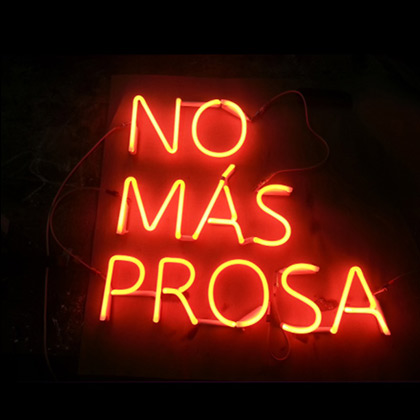

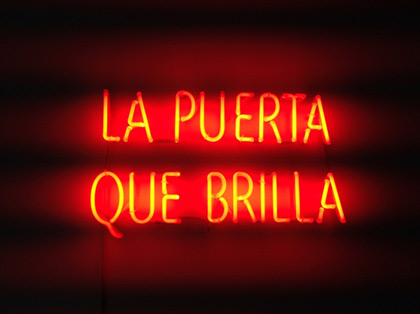



Words… The material our lives are made of. Messages, thoughs, dreams… In a world more and more colonized by words, the discourse seems to be feeding itself, to the point there seems to be no more meaning beyond the discurse itself. A rose is a rose. Or it isn’t?
Like a voice coming from the other side of the mirror, Crying for help takes the city and erupts in the middle of the irrepressible wave of messages to ask us to look at a deeper place: to the avalaible secret. A secret contained inside his own messages, yes -some of them seemingly obvious, others defiant, like poetry itself. But also a secret that meditates –and make us to meditate- on the meaning of discourse itself. Let’s take a look beyond words, may be before or between them. Let’s think about words not like finished objects but like something that lives and “breaths” and see what happens. And so Enrique Baeza plays the irresistible game of looking for that which lies at the core of language itself: where and when is meaning created? How a fragmented discourse interacts and articulates itself? Is it still possible to make a place to the notion of truth? What happens to the language –the very material we are made of- when you put a mirror before the discourse that feeds itselfs and use words against words? And what happen to us, in us? Because messages talk to us, but above else talk about us, his messages –his fragments- confront us to our internal and also our social self. Even –hopefully- force us to react.
What he calls propagandistic poetry is no more, no less than a trascendental and playful aesthetic experience betwen artist and reader/watcher and a game of irony in the most schlegelian sense: a message wich multiplies itself in many directions, some of them contradictory, with the aim to find a meaning that lies beyond words and which constitutes the core of human thinking. This is the game he proposes on us: to find out this avalaible secret, this poetic thruth, that suits the autor and the reader alike to find our (or look for) the sacred sense of words out from propaganda, their less sacred place. Words, thoughs, messages like acts on themselves.
Victoria Simó
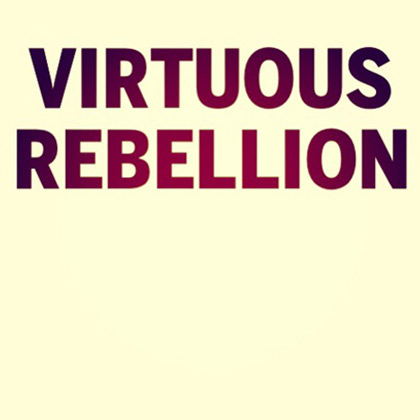


ENRIQUE BAEZA : CHAMANISMO TEXTUAL
Asistimos a un momento de colapso y accidente general. El cuerpo social, como ente que habita el espacio físico de la ciudad y el espacio virtual del cibermundo globalizado, se aboca, pese a las apariencias, a su desintegración. El desvanecimiento de la democracia representativa da paso simultáneo a la aceleración constante como modelo vivencial. No es de extrañar que las resistencias a este proceso coincidan en su mayoría en el propósito de resituar al individuo frente al procomún.
La sutil tiranía mediática destituye el elemento reflexivo, dando paso al automatismo como régimen de conducta. Sólo la mirada crítica y el análisis permiten trascender el estadio de puesta en escena, de la cosmética que edifica el mundo global. Sólo la comprensión de los códigos que lo rigen permite una contestación que debe además saber insertarse en sus propios términos. Responder a la disuasión y el miedo, lenguajes transversales que subyacen bajo la ampulosidad del desempeño individualista promovido por la esfera pública virtual, exige capacidad de sugestión con auténtica y subrepticia incidencia social.
Ante el exceso de información direccionada, el uso apropiado del lenguaje como significante del mundo y como estructura de comunicación deviene un ejercicio de ética en sí, aquel que señala lo que se pierde, o que vislumbra con claridad entre el ruido, en medio del actual estado de reorganización.
Interpretando la relativización de la humanidad, Enrique Baeza denuncia con agudeza el atentado de la realidad. Pertinente y preciso, el joven artista y veterano de la comunicación recurre a la condición performativa del lenguaje en su estado seminal. Enunciaciones breves a medio camino entre la poesía, el slogan publicitario o el statement propagandístico donde la fuerza fáctica del gesto escrito nos confronta; irónica y juguetona nos embiste, nos sumerge, o acaricia, implicándonos en nuestra propia relación emocionante y dolorosa con la verdad.
Nuevo ritmo acarrea nuevo lenguaje y con él nuevos imaginarios. La aceleración sistémica reclama otro pulso holístico y otras vibraciones a la emancipación de la conciencia como gestora de la revolución interior. Más allá del factor intelectual o cognitivo, el perspicaz uso de la paradoja y la transliteración en la obra de Enrique Baeza es una oportuna conducta moral donde el lenguaje resurge como cosmogonía del afecto. No hay moraleja, sino conjuro y acertijo, en su chamanismo textual sacro y profano.
Minuciosamente concebidas, sus frases se han materializado con solvencia en una suerte de dialéctica contrapublicitaria integral. En el espacio público, mediante textos simples en negro sobre blanco acabados eficazmente con un punto, en mupis de Nueva York, y en el privado, mediante neones de pequeña escala que renuncian a la grandilocuencia de su uso comercial para apelar a la proximidad.
Heredero de una tradición que incluye a Brossa, Holzer, Baldessari, Kosuth, Wiener o Ruscha, su propuesta reivindica la comunicación interpersonal desde la íntima relación del individuo con el lenguaje, haciendo de las palabras el lugar de encuentro. Espacios de escisión. Fracturas en la dramaturgia del paisaje interior para activar la ecología psíquica y espiritual del cuerpo social al que pertenecemos; ese cuyo pensamiento, bien lo sabe Enrique Baeza, antes que dormido está hipnotizado.
Álex Brahim, comisario independiente.
